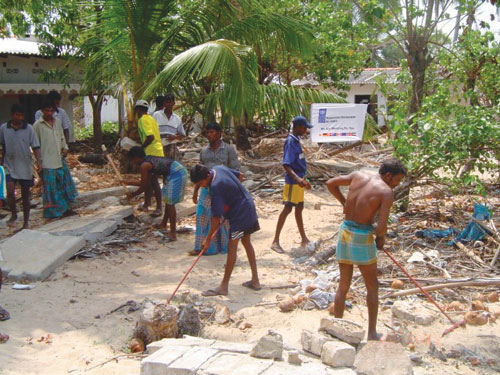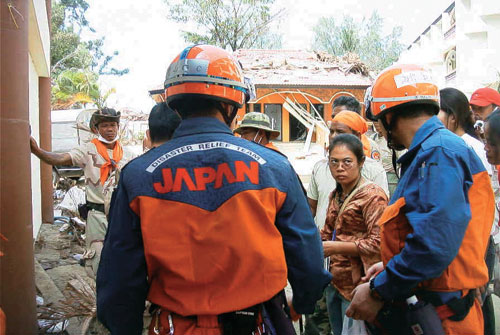Japan's Official Development Assistance White Paper 2005
Main Text > Part II ODA DISBURSEMENTS IN FISCAL YEAR 2004 > Chapter 2 Details and New Policies about Japan's ODA:Striving for Further ODA Reforms > Section 1. Major Activities in Fiscal Year 2004 > 3.Assistance in Response to the Major Earthquake off the Coast of Sumatra and Tsunami in the Indian Ocean
3. Assistance in Response to the Major Earthquake off the Coast of Sumatra and Tsunami in the Indian Ocean
As a result of the major earthquake estimated at magnitude 9.0 that took place on December 26, 2004, off the coast of Sumatra, Indonesia and the following large-scale tsunami, countries surrounding the Indian Ocean suffered damage on an unprecedented scale, causing serious damage to their economic and social foundations. In Asia and Africa, 1.2 million people were affected 9 and 210,000 people were killed or left missing. 10 Although the majority of people who lost their lives were from Asia and Africa, there were also people from Europe, the United States, and many other countries and regions, including 37 Japanese. As aftershocks continued, another earthquake of magnitude 8.5 occurred off the coast of Sumatra Island on March 29, 2005, killing 915 people. 11
In response to such serious damages, Japan, as a fellow Asian partner, took prompt action. In the immediate aftermath of the tsunami, Japan announced on December 28 that it would provide assistance of approximately US$30 million for immediate emergency measures and rehabilitation. Furthermore, Japan dispatched the Japan Disaster Relief Team ( JDRT ) comprised of a rescue team, a medical team, and an experts team, as well as Self-Defense Forces ( SDF ) units to the affected areas. A total of 1,913 rescue personnel took part in the rescue efforts.
On January 1, 2005, Prime Minister Koizumi announced that Japan would provide assistance to the maximum extent possible in three ways: financial resources, knowledge and expertise, and human resources.
As for financial resources, he announced that Japan would extend up to US$500 million of grant money to affected countries and international organizations concerned to cope with the damage as emergency assistance for the time being. On January 6, Prime Minister Koizumi, with Foreign Minister Machimura, attended the Special Association of Southeast Asian Nations ( ASEAN ) Leaders' Meeting on the Aftermath of Earthquake and Tsunami held in Jakarta. He expressed Japan's condolences to those who lost their lives, as well as sympathy, as a country having experienced similar disasters. At the same time, he announced the cooperation in responding to the United Nations Flash Appeal to the maximum extent possible, and reaffirmed that Japan would provide assistance to the maximum extent possible in three ways: financial resources, knowledge and expertise, and human resources.
(1) Financial Cooperation
Japan extended a total of US$3.02 million in emergency grant aid to Indonesia, Sri Lanka, and the Maldives immediately following the earthquake. It also provided emergency assistance in kind worth ¥60 million, including tents, water purifiers, blankets, generators, and medical supplies to these three countries and Thailand. Furthermore, Japan, together with other Paris Club countries, agreed to grant a debt moratorium for 2005 concerning eligible debts for countries that requested it, and Indonesia and Sri Lanka are being given this moratorium.

Assistance through UNDP for damage caused by the tsunami (Sri Lanka)
Column 1 An Interview with UNDP Regional Director for Asia and the Pacific Mr. Hafiz Pasha
Of the US$500 million of grant money as emergency assistance pledged by Japan, the decision was made to extend US$250 million as bilateral grant aid o those countries severely hit by the disaster, and the remaining US$250 million as emergency humanitarian assistance via international organizations. Japan completed the contribution of the former US$250 million on January 19, and the latter on January 21, and has continued with specific assistance plans, one after another. Japan was regarded highly by the disaster-affected countries and international organizations for being the most expeditious of all the countries that pledged to extend assistance in funding the amount promised.
Of the emergency assistance, Japan extended approximately ¥14.6 billion to Indonesia, approximately ¥8 billion to Sri Lanka, and approximately ¥2 billion to the Maldives in bilateral, non-project grant aid. These funds were to be used specifically to purchase medical supplies, water trucks, generators, and other equipment to rebuild elementary and junior high schools, and to repair police stations and buildings.
Japan has provided assistance to 15 international organizations. Seventy million dollars was offered to the United Nations Children's Fund ( UNICEF ) to protect and ensure the survival of children, US$60 million was offered to the World Food Programme ( WFP ) for emergency food distribution, the shipment of relief supplies and other activities, and US$25 million was offered to the International Organization for Migration ( IOM ) for victim registration, construction of temporary housing, and shipping services.

JDRT providing assistance to the tsunami-affected area (Photo: JICA)
Besides the US$500 million in grant assistance, Japan utilized the Japan Social Development Fund ( JSDF ) in the World Bank, and the Japan Fund for Poverty Reduction ( JFPR ), which was set up in the Asian Development Bank ( ADB ), to provide rehabilitation and reconstruction assistance. It offered US$20 million from each source, totalling US$40 million, as assistance for damages caused by the tsunami on January 11. By the end of March 2005, Japan had approved six plans for assistance, such as assistance for rebuilding people's livelihoods, worth approximately US$8.3 million. In addition, a decision was made on June 8 to extend approximately ¥10 billion in yen loans to Sri Lanka for reconstruction of small-scale infrastructures and promotion of small businesses. By providing loans for restoring and developing the economic infrastructure in Sri Lanka's coastal areas that were affected by the tsunami, and for helping its tsunami-struck fishing, tourism, and other small businesses resume their economic activities, among other things, Japan contributes to the economic reconstruction of the regions affected by the tsunami.
In order to provide assistance for tsunami disaster, it is essential to cooperate with Japanese non-governmental organizations ( NGOs ) and others that can quickly carry out operations in disaster areas, such as NGOs under the umbrella of the Japan Platform. *1 Japan has been providing funds to Japan Platform every year since FY2001, and NGOs under its umbrella have been utilizing such funds in response to the recent tsunami disaster in Sumatra to distribute emergency supplies, provide emergency medical assistance, build temporary housing, and provide psychological care to children affected by the disaster, among other assistance, to the disaster refugees. Furthermore, in order to realize even more precise and prompt assistance to Indonesia, Sri Lanka, Thailand, and India, Japan is offering aid to other Japanese NGOs through Grant Assistance for Japanese NGO Projects, and providing disaster victims with rubble removal equipment and materials for building temporary housing, schools, and toilets through Grassroots Human Security Grant Aid.
Column 2 Useful Japanese Contributions for the Major Earthquake off the Coast of Sumatra and the Tsunami in the Indian Ocean
(2) Human Assistance
In addition to dispatching the JDRT's medical team to Indonesia, Sri Lanka, Thailand, and the Maldives, Japan dispatched to some countries a total of 247 personnel as relief teams made up of personnel from the National Police Agency, Fire and Disaster Management Agency, Japan Coast Guard, and other agencies, and as experts teams to provide assistance in areas including DNA identification and search technology.
(3) Utilizing Japan's Knowledge and Expertise
As ways of utilizing its knowledge and expertise, Japan announced at the WCDR held in January 2005 in the immediate aftermath of the earthquake, that it would make active contributions through international organizations and bilateral cooperation to establish tsunami early warning mechanisms in the Indian Ocean. It also announced the Initiative for Disaster Reduction through ODA, which is Japan's aid policy for disaster reduction utilizing ODA (see Box 2 for details on the Initiative for Disaster Reduction through ODA). Furthermore, at the Ministerial Meeting on Regional Cooperation on Tsunami Early Warning Arrangements, which was held in Phuket sponsored by the government of Thailand, a ministerial declaration was given in which various countries and organizations promised to cooperate in the development of temporary tsunami early warning systems, based on a proposal made by Japan.
Furthermore, based on the Common Statement of the Special Session on the Indian Ocean Disaster, which was released at the WCDR, Japan held UN-sponsored policy dialogues with government officials of disaster-affected countries using funds provided through the UN (International Strategy for Disaster Reduction ( ISDR ) Office) and held regional training sponsored by the Japan International Cooperation Agency ( JICA ) on tsunami disaster reduction measures in Japan. Through such activities, Japan is making full use of its knowledge and technology for tsunami disaster reduction in advancing its international cooperation with support from relevant ministries and agencies, such as the Cabinet Office and Japan Meteorological Agency, as well as the Asian Disaster Reduction Center.
The economic and social foundations of countries struck by the recent major earthquakes and tsunami have suffered serious damage, and they are in need of prompt restoration and reconstruction. To this end, the international community must work together to provide not only short-term emergency assistance, but also ongoing mid- to long-term assistance so that the affected areas can be rebuilt to become a region that is resistant to disasters. On the occasion of the Asian-African Summit in April 2005, Prime Minister Koizumi announced that Japan would be providing more than US$2.5 billion over the next five years in assistance for disaster prevention and mitigation, and reconstruction measures in Asia, Africa, and other regions. Japan will work together with concerned countries and international organizations to implement the assistance measures it has announced thus far in a steady and efficient manner, and continue to provide assistance based on mid- to long-term restoration and reconstruction plans formulated according to the situation of each country.


 Next Page
Next Page